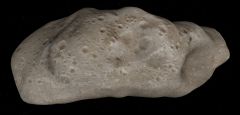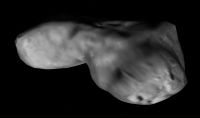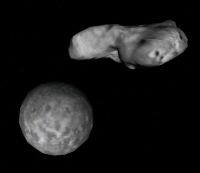243 Ida
| 243 Ida | |
|---|---|

| |
| 243 Ida from AsteroidPack_v1.00.zip in Orbiter 2002P3 | |
| Designation | |
| Name | 243 Ida |
| Reference body | Sun |
| Planetary mean orbits | |
| Epoch | 2006 |
| Semimajor axis (a) | 428095018097.267 m |
| Eccentricity (e) | 0.0461355886406573 |
| Inclination (i) | 1.137396509° (0.0198513139804016 radian) |
| Longitude of the ascending node (LAN, ☊) | 324.2022181° (5.65839614806934 radian) |
| Longitude of periapsis (ϖ) | 432.7112368° (7.55223579223376 radian) |
| Mean longitude (L) | 767.1967825° (13.3901098652706 radian) |
| Selected physical parameters | |
| Mean radius | 20250 km |
| Mass | 1×1017 kg |
| Rotation elements | |
| SidRotPeriod | 16682.4 seconds (4.634 hours) |
| SidRotOffset | 0 |
| Obliqutiy | 0 |
| LAN | 0 |
| Note | *Elements given are from 243 Ida.cfg (AsteroidPack_v1.00.zip) |
243 Ida is a large asteroid shaped very elongated, perhaps a contact binary. It was discovered by Johann Palisa on 29 September 1884 and was named for a nurse of Zeus. On 17 February 1994, Ida was discovered to boast a small moon as it was imaged during the flyby of the Gallileo spacecraft in 1993 as it flew by enroute to Jupiter.
243 Ida in Orbiter
243 Ida and Dactyl were first introduced with the release of MainBeltAsteroids051403.zip in May 2003.
Note that the landing surface as given in the config file is spherical, but the visual of these bodies are not, if you land, you will likely be above or below the visual surface.
| Add-on | Source | Version | Author | Type | Release Date | Compatibility | Wiki article |
|---|---|---|---|---|---|---|---|
| Asteroid Pack 1.00 | O-F Resources | 2004-11-21 | Nighthawke | Scenery | 21 November 2004 | ||
| Main Belt Asteroids v1.0 | O-F Resources | v1.0 | Unknown OHM Addon Developer | Scenery | 14 May 2003 | ||
See also
243 Ida at Wikipedia Dactyl at Wikipedia
Gallery
243 Ida imaged by Gallileo on 28 August 1993
| edit The Solar System | |
|---|---|
| Central star |
Sun (Sol) |
| Planets |
Mercury - Venus - Earth - Mars - Jupiter - Saturn - Uranus - Neptune |
| Natural satellites |
Moon - Phobos - Deimos - Io - Europa - Ganymede - Titan - more... |
| Add-ons |
Planets - Dwarf Planets - Small objects - Natural satellites - Alternative star systems |





